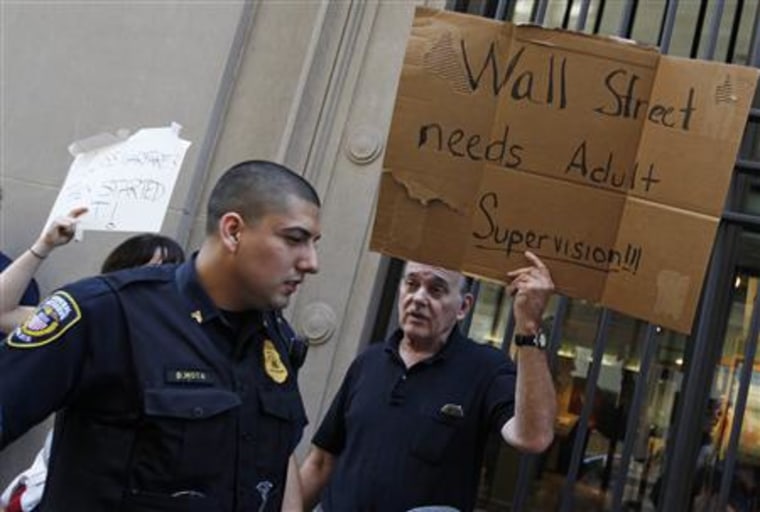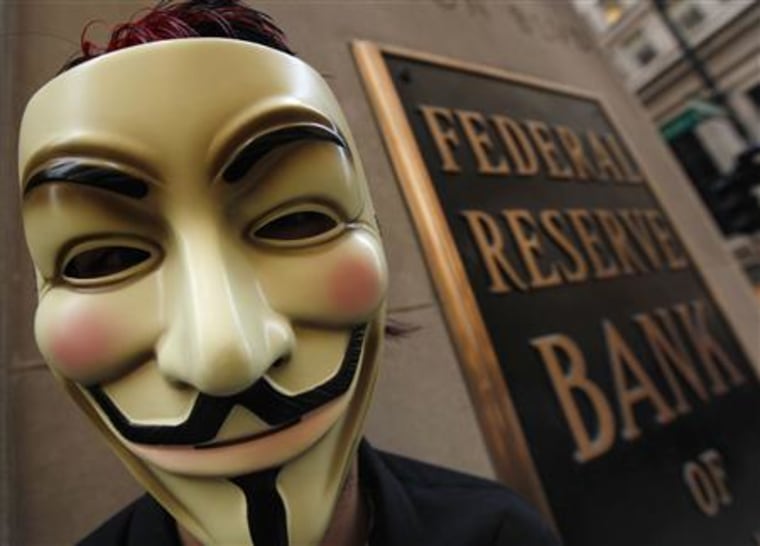Unions gave a high-profile boost to the long-running protest against Wall Street and economic inequality Wednesday, with their members joining thousands of protesters in a lower Manhattan march. Across the country, students at several colleges walked out of classes in solidarity.
People gathered at Foley Square, an area encircled by courthouses and named for "Big Tom" Foley, a former blacksmith's helper who became a prominent state Democratic leader. From there they marched to Zuccotti Park, the protesters' unofficial headquarters.
Sterling W. Roberson, vice president for the United Federation of Teachers, said union members shared the same ideals as activists who have been camped out in sleeping bags for more than two weeks.
"The middle class is taking the burden but the wealthiest of our state and country are not," he said.
Thousands of protesters packed Foley Square, standing behind police barricades in front of the courthouse buildings. Some wore union T-shirts, others were in business attire, and many left work early to be there.
People in the crowd were carrying red-white-and-blue signs bearing a giant star-graced A — representing the motto "Rebuild America." Other signs bore slogans including "Tax Wall Street" and "Make Jobs Not Cuts."
Some union members were there from other states.
Karen Higgins, a co-president of National Nurses United, came down with a group of colleagues from Boston. She said they had seen patients who skipped important medical tests because they couldn't afford them.
"Tax Wall Street," she said. "Those who make all the money need to start paying their fair share."
Roxanne Pauline, a coordinator for the Northeastern Pennsylvania Area Labor Federation, said some of her union's members plan to stay in Zuccotti Park over the weekend.
"They'll teach the younger people what unions are — that they're not thugs or mobsters, but working people," she said.
The Occupy Wall Street protests started Sept. 17 with a few dozen demonstrators who tried to pitch tents in front of the New York Stock Exchange. Since then, hundreds have set up camp nearby in Zuccotti Park and have become increasingly organized, lining up medical aid and legal help and printing their own newspaper.
Previous marches have resulted in mass arrests. Police said there were about 28 arrests on Wednesday night, mostly for disorderly conduct. But at least one arrest was for assaulting a
police officer; authorities said a demonstrator knocked an officer off his scooter.
The demonstrators Wednesday night posted a video on YouTube in which a police official is seen swinging a baton to clear a crowd of protesters. It was unclear from the angle of the video if anyone was hit. Officers are allowed to use batons and pepper spray in crowd control efforts.
Another arrest came when a group of about 300 people decided to start marching again Wednesday night after the main march had ended.
The protesters have varied causes but have reserved most of their criticism for Wall Street. They've spoken out about unemployment and economic inequality, saying "we are the 99 percent" — in contrast to the wealthiest 1 percent of Americans.
Other groups have periodically gathered and protested in spots throughout the country. One of the larger ones Wednesday was in Boston, where about 200 Northeastern University students gathered on campus to condemn what they called corporate control of government and the spiraling costs of their education.
"We're letting inequality build in this country and there's not enough resistance," said senior international affairs major Andrea Gordillo, of Sarasota, Fla.
"There are real bread-and-butter issues in this country — like the future of Social Security and our parents' retirement — that aren't being taken care of now, and we're the ones who are going to be called on to fix that," she said of her generation.
Hundreds of college students at New York's sprawling public university system walked out of classes Wednesday afternoon, some in a show of solidarity for the Wall Street movement but many more concerned with worries closer to home. Protests were scheduled at State University of New York campuses including Albany, Buffalo, Binghamton, New Paltz and Purchase.
Danielle Kingsbury, a 21-year-old senior from New Paltz, said she walked out of an American literature class to show support for some of her professors who she said have had their workloads increased because of budget cuts.
"The state of education in our country is ridiculous," said Kingsbury, who plans to teach. "The state doesn't care about it and we need to fight back about that."
Not every campus appeared to feel the rumblings of dissent Wednesday. At the University of Michigan in Ann Arbor, there were students publicizing breast cancer awareness and National Coming Out Week, students crawling on their elbows in an apparent fraternity hazing ritual, quarreling evangelicals and even a flash mob to promote physical fitness, but no sign of the Wall Street protests.

Senior Alex Brown tried to promote an event on Facebook, but wasn't having success. "While people are really disgusted with a government that can't compromise and the richest 400 people have more wealth than the poorest 150 million, it's not enough to reach a fever pitch," he said.
But protests still occurred in other cities.
"I am a mother. I want a better world for my children," said Lisa Clapier, 46, a producer who lives in Venice, California, who joined protesters in Los Angeles.
In Seattle, where protesters had set up an encampment in a city park, about two dozen people were arrested for defying police orders to remove their tents in Westlake Park downtown.
"The cops are doing their job, and we're going to let them do their job. Then we'll come back and occupy the park again," said Michael Trimarco, 39, an unemployed carpenter.
In San Francisco, a crowd of several hundred people marched around the financial district, chanting "They got bailed out, we got sold out" and "Join our ranks, stop the banks."
"This is the beginning of a movement," said Sidney Gillette, a nurse at Children's Hospital in Oakland.
Filmmaker Michael Moore was among the crowd in New York, shaking hands and posing for pictures.
"Everywhere you go in this country, you see the Occupy Wall Street movement," he said. "In the first days, people were putting it down, saying these are a bunch of hippies.
"But the average American who has lost health care, who is going to lose his job, whose home is in foreclosure can relate to this," he said.
